Freedom and Negativity in Beckett and Adorno
FOUNDING CRITICAL THEORY
Series Editors:
Owen Hulatt, Teaching Fellow, Department of Philosophy, University of York
Darrow Schecter, Reader in Critical Theory, University of Sussex
Editorial Review Board:
Brian OConnor, University College Dublin, Ireland
Gordon Finlayson, University of Sussex, UK
Werner Bonefeld, University of York, UK
Fred Rush, Notre Dame University, USA
Jay Bernstein, The New School, USA
Lambert Zuidervaart, Institute for Christian Studies, Canada
Deborah Cook, University of Windsor, Canada
Christoph Menke, Goethe Universitat, Germany
Andrew Arato, The New School, USA
This series publishes original research on prominent figures, texts and topics in, and associated with, the first generation of Frankfurt School Critical Theory. The series comprises specialized treatments of topics and thinkers together with new translations of key texts from the period. Emphasis is lent to Critical Theory as an on-going research project, and both its original research and historical scholarship is articulated in these terms. Critical Theory contains an intrinsic commitment to inter-disciplinary research, and this series attempts to honour this commitment where possible.
The Aesthetic Ground of Critical Theory, edited by Nathan Ross.
Communication and Expression, by Philip Hogh, translated by Antonia Hofsttter
Freedom and Negativity in Beckett and Adorno, by Natalie Leeder
Freedom and Negativity in Beckett and Adorno
Something or Nothing
Natalie Leeder

Published by Rowman & Littlefield International Ltd
Unit A, Whitacre Mews, 26-34 Stannary Street, London SE11 4AB
www.rowmaninternational.com
Rowman & Littlefield International Ltd. is an affiliate of Rowman & Littlefield
4501 Forbes Boulevard, Suite 200, Lanham, Maryland 20706, USA
With additional offices in Boulder, New York, Toronto (Canada), and Plymouth (UK)
www.rowman.com
Copyright 2017 Natalie Leeder
All rights reserved. No part of this book may be reproduced in any form or by any electronic or mechanical means, including information storage and retrieval systems, without written permission from the publisher, except by a reviewer who may quote passages in a review.
British Library Cataloguing in Publication Data
A catalogue record for this book is available from the British Library
ISBN: HB 978-1-78660-319-7
Library of Congress Cataloging-in-Publication Data
ISBN: 978-1-78660-319-7 (cloth : alk. paper)
ISBN: 978-1-78660-321-0 (electronic)
 The paper used in this publication meets the minimum requirements of American National Standard for Information SciencesPermanence of Paper for Printed Library Materials, ANSI/NISO Z39.48-1992.
The paper used in this publication meets the minimum requirements of American National Standard for Information SciencesPermanence of Paper for Printed Library Materials, ANSI/NISO Z39.48-1992.
Printed in the United States of America
Contents
First and foremost, I would like to thank my PhD supervisor, Andrew Gibson, without whose support and absolute faith I would not have survived the doctoral study that formed the basis of this book. His inspirational supervision has developed my mind more than I can say. To Andrew Bowie, too, I owe a great debt, not least for responding to my queries, both deep and superficial, at all hours of the day and night and always with great humour, kindness and thought.
Since nurturing my burgeoning interest in Adorno during my masters study, Darrow Schecter has supported me with generosity and enthusiasm, always believing in the project. I will ever be grateful to David Addyman for introducing me to Beckett during my undergraduate years and for his uniquely Beckettian brand of friendship. Rupert Gough and the Choir of Royal Holloway deserve a special mention for accommodating my study and providing me with a wonderful space of release and fulfilment. Grateful acknowledgement is due to Royal Holloway for funding my doctoral research. I have, furthermore, been constantly overwhelmed by the kindness of friends, acquaintances and strangers, too innumerable to list, who have helped to smooth the path.
My heartfelt thanks to Sam Hall, who was my first port of call for every question, thought and fear. My mum, dad and brothers, Joseph and Simeon, have provided unending support, for which I cannot thank them enough. Love and thanks also to my nanny, eternally proud of her granddaughter, and my grandad, who would have loved to have seen this book.
Samuel Beckett
All quotations from Beckett are cited in the body of the text with the relevant full title. A number of his texts are most accessible within collected works. For ease of reference, I allude to each individual text by its full title and include below the collections full citation and relevant page numbers.
The Complete Dramatic Works. London: Faber and Faber, 2006.
Waiting for Godot, 788.
Endgame, 89134.
Happy Days, 13568.
All That Fall, 169200.
Krapps Last Tape, 21324.
Rough for Theatre II, 23550.
Embers, 25164.
Rough for Radio I, 26572.
Rough for Radio II, 27384.
Words and Music, 28594.
Cascando, 295304.
Film, 32134.
Eh Joe, 35968.
Ghost Trio, 40514.
Catastrophe, 45562.
Nacht und Trume, 46366.
The Complete Short Prose, 19291989. Edited by S. E. Gontarski. New York: Grove Press, 1995.
First Love, 2545.
The Expelled, 4660.
The Calmative, 6177.
The End, 7899.
All Strange Away, 16981.
Imagination Dead Imagine, 1825.
Enough, 18692.
The Lost Ones, 20223.
NoHow On: Company, Ill Seen Ill Said, Worstward Ho. Edited by S. E. Gontarski. New York: Grove Press, 1996.
Company, 146.
Ill Seen Ill Said, 4786.
Worstward Ho, 87116.
Eleutheria. Translated by Barbara Wright. London: Faber and Faber, 1996.How It Is. London: Calder & Boyars, 1964.Molloy. Edited by Shane Weller. London: Faber and Faber, 2009.Malone Dies. Edited by Peter Boxall. London: Faber and Faber, 2010.Murphy. Edited by J. C. C. Mays. London: Faber and Faber, 2009.The Unnamable. Edited by Steven Connor. London: Faber and Faber, 2010.
Theodor W. Adorno
ARThe Adorno Reader. Edited by Brian OConnor. Malden, MA and Oxford: Blackwell, 2000.
ATAesthetic Theory. Edited by Gretel Adorno and Rolf Tiedemann. Translated by Robert Hullot-Kentor. London: Continuum, 1997.
CIThe Culture Industry: Selected Essays on Mass Culture. Edited by J. M. Bernstein. London: Routledge, 1991.
CMCritical Models: Interventions and Catchwords. Translated by Henry W. Pickford. New York: Columbia University Press, 2005.
HFHistory and Freedom: Lectures 19641965. Edited by Rolf Tiedemann. Translated by Rodney Livingstone. Cambridge, MA: Polity Press, 2008.
ISIntroduction to Sociology. Edited by Christoph Gdde. Translated by Edmund Jephcott. Cambridge: Polity Press, 2000.
K Kierkegaard: Construction of the Aesthetic. Translated and edited by Robert Hullot-Kentor. Minneapolis: University of Minnesota Press, 1989.
KCPRKants Critique of Pure Reason. Edited by Rolf Tiedemann. Translated by Rodney Livingstone. Cambridge: Polity Press, 2001.
LNDLectures on Negative Dialectics
Next page

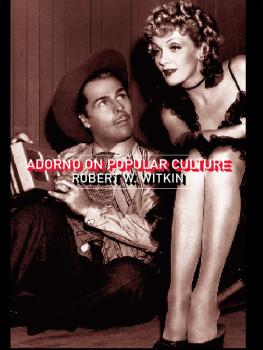
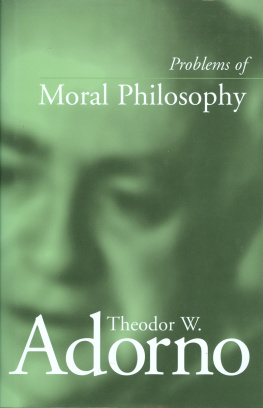
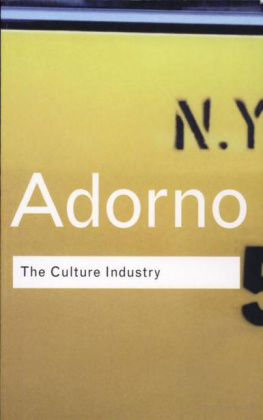
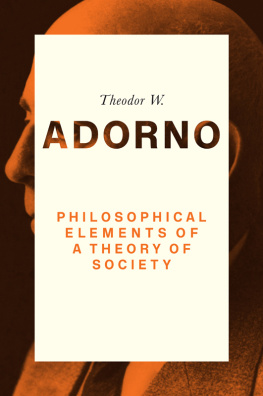
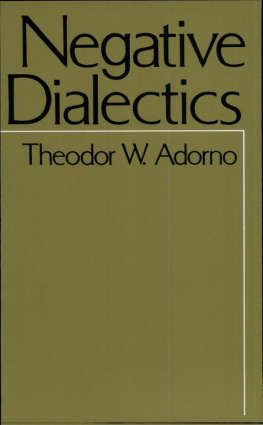
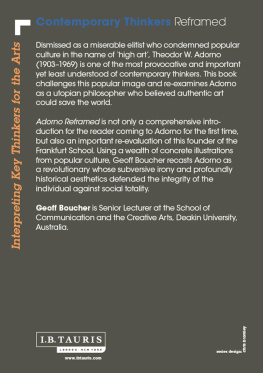
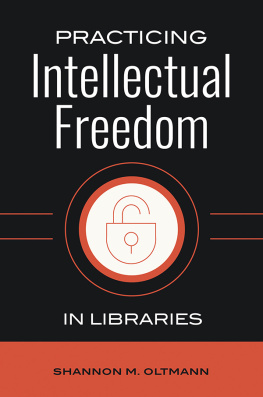
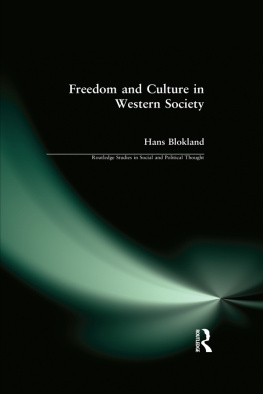
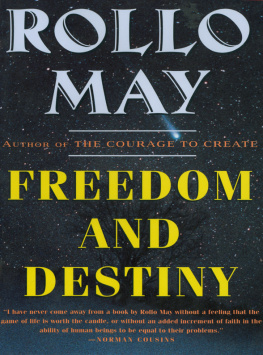
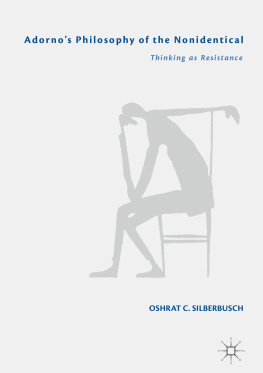
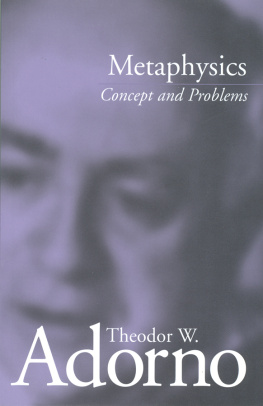
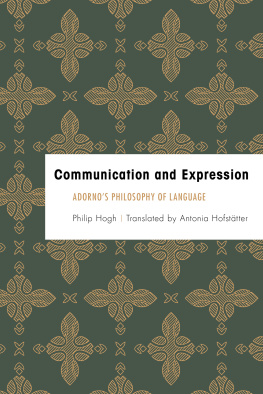
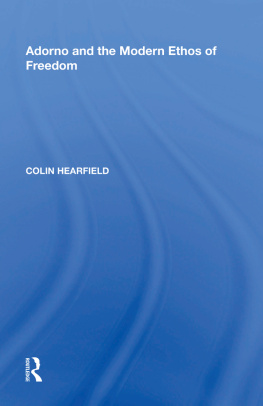
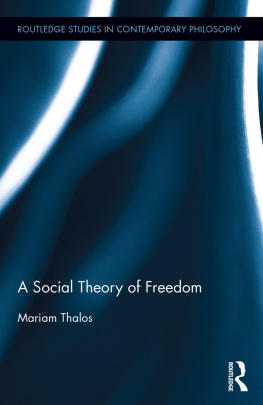
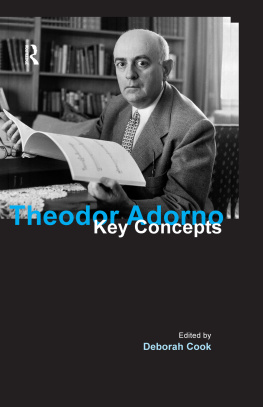


 The paper used in this publication meets the minimum requirements of American National Standard for Information SciencesPermanence of Paper for Printed Library Materials, ANSI/NISO Z39.48-1992.
The paper used in this publication meets the minimum requirements of American National Standard for Information SciencesPermanence of Paper for Printed Library Materials, ANSI/NISO Z39.48-1992.